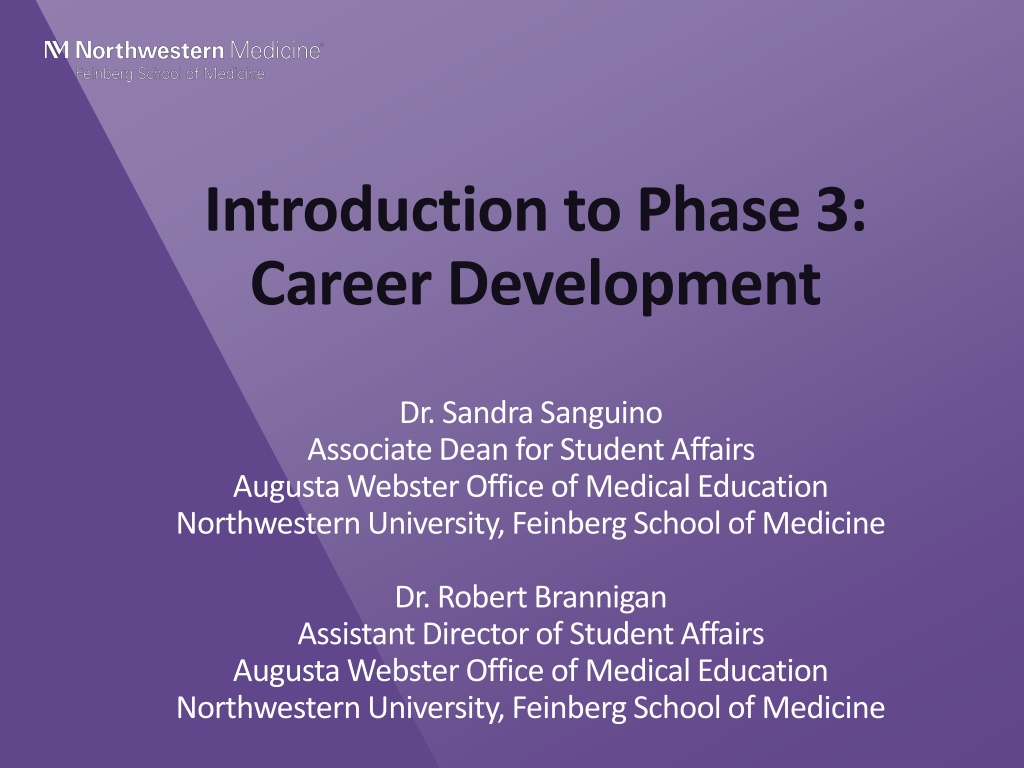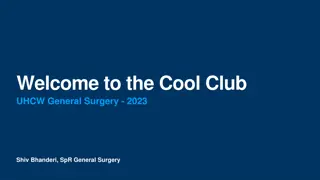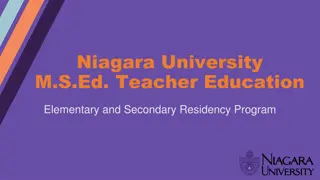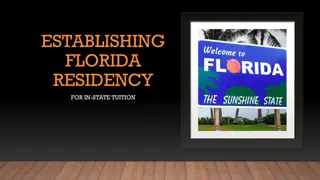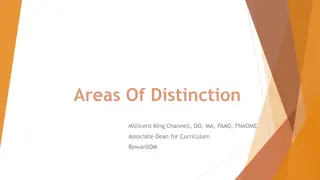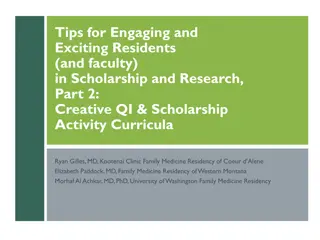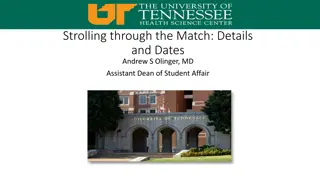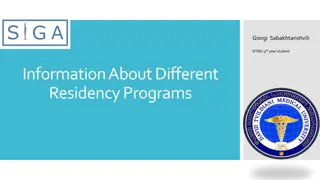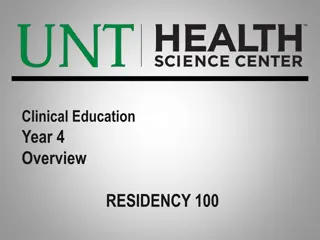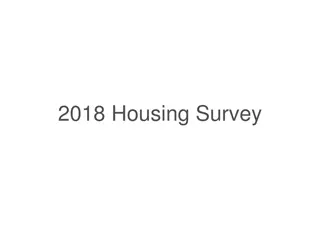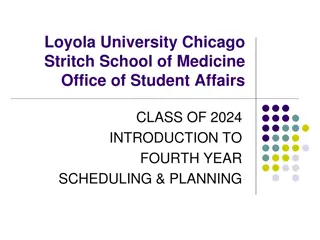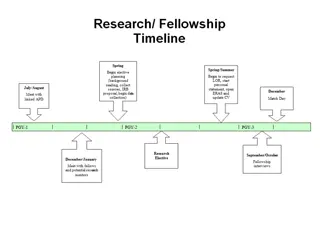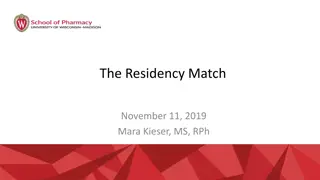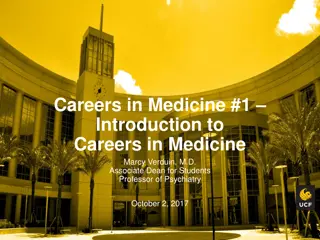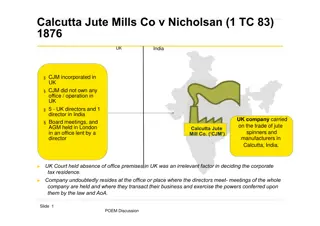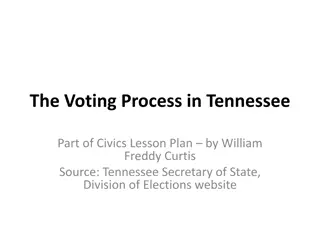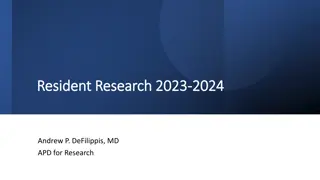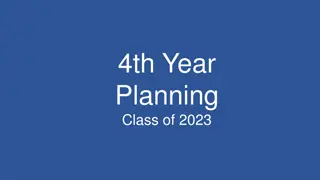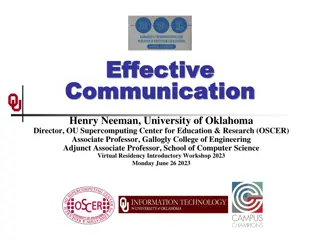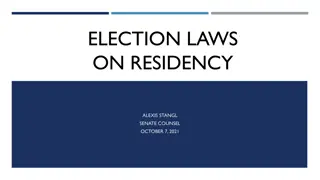Residency Application Process and Strategies
In this resourceful presentation, Dr. Sandra Sanguino and Dr. Robert Brannigan from Northwestern University guide you through the residency application process, including crucial steps like preparing personal statements, utilizing the ERAS system, understanding matching services, and managing relevant fees. Stay informed about the evolving impact of COVID-19 on residency applications and optimize your chances for success. Keep updated on key timelines and strategies to navigate the competitive field of medical residency programs.
Download Presentation

Please find below an Image/Link to download the presentation.
The content on the website is provided AS IS for your information and personal use only. It may not be sold, licensed, or shared on other websites without obtaining consent from the author.If you encounter any issues during the download, it is possible that the publisher has removed the file from their server.
You are allowed to download the files provided on this website for personal or commercial use, subject to the condition that they are used lawfully. All files are the property of their respective owners.
The content on the website is provided AS IS for your information and personal use only. It may not be sold, licensed, or shared on other websites without obtaining consent from the author.
E N D
Presentation Transcript
Introduction to Phase 3: Career Development Dr. Sandra Sanguino Associate Dean for Student Affairs Augusta Webster Office of Medical Education Northwestern University, Feinberg School of Medicine Dr. Robert Brannigan Assistant Director of Student Affairs Augusta Webster Office of Medical Education Northwestern University, Feinberg School of Medicine
Relevant Financial Disclosures Sandra Sanguino, MD -I have nothing to disclose Robert Brannigan, MD -I have nothing to disclose 2
Applying for Residency in the Wake of the COVID-19 Pandemic Some of the information provided today might change as response to the pandemic continues to unfold. We will continue to keep you updated as new information becomes available. Stay in touch with us, check your email. 3
Residency Application -Overview of the Process and Timeline Writing the Personal Statement MSPE Worksheet Putting it All Together -Steps to Optimize Success
Residency Application Process Overview and Timeline
ERAS Electronic Residency Application Service http://www.aamc.org/students/eras/ Most specialty programs use ERAS as an application service
Matching Services After the application and interview processes are complete students and programs will rank each other and match through one of the matching services: NRMP Match: -National Resident Matching Program SF (San Francisco) Match: -Ophthalmology Match AUA (American Urological Association) Match: -Urology Match
ERAS Fees (As of Today) Under the Same Specialty and Accrediting Body Programs Up to 10: $99 Programs 11-20: $14 each Programs21-30: $18 each Programs31 + : $26 each USMLE Transcript Fees -The NBME charges $80 for transmitting USMLE transcripts, regardless of the number of requests. This fee is collected by ERAS and will appear on your invoice.
Residency Application Timeline ~ September 5, 2020: Applicants can start applying to programs September 13-14, 2020: Transcripts uploaded Tentatively September 15, 2020 (11:00 am CT): NRMP registration opens September 15, 2020: Residency programs start receiving applications October 1, 2020: MSPE released
Timeline November 30, 2020: Deadline to register for NRMP January 15, 2021: Rank order site opens February 19, 2021: Rank order list deadline March 15, 2021: SOAP begins March 19, 2021: Match Day!
Ophthalmology Match Also known as the San Francisco Match https://www.sfmatch.org/ Monday June 1, 2020: Applicant Registration Opens Wednesday September 2, 2020: Target Deadline to Complete Application - This is not a true deadline. Individual programs have their own deadlines - Applicants should contact programs individually for dates December 2020: Programs and applicants begin submitting rank-ordered preference lists. Tuesday January 5, 2021: ALL rank lists must be submitted by 12:00 PM (noon) PST. Tuesday January 12, 2020:Match results made available to applicants, medical schools and programs
Urology Residency Program Match Also known as the AUA (American Urological Association) Urology Match https://www.auanet.org/ Below dates are tentative June 2020: Applicant Registration Opens ($75) - You will be issued an AUA ID number ~ Friday December 18, 2020: Registration deadline ~ Friday November 13, 2020: Programs and applicants begin submitting rank-ordered preference lists. ~ Thursday January 7, 2021: Rank list deadline. ~ Thursday January 14, 2021:Match results made available to medical schools, programs and applicants
ERAS Tips Applications - MyERAS does not allow applicants to customize application for individual programs - Applicants may change information in the MyERAS application at any time prior to certifying and submitting (personal information can be updated) - Publications Personal Statement - Must contain a title, only visible to the applicant - No limit to how many personal statements an applicant can create - Changes to the personal statement can be made throughout the season, but unlikely the changes will be read USMLE Transcripts (fee collected by ERAS, appears on invoice) Photos (Professional available, Jenny has sent information about this) - Class composite photograph must be professional
ERAS Tips Letters of Recommendation -Must create a separate LoR entry for each LoR -The specialty to which this letter will be assigned field is not viewable by programs -Applicants may only assign up to four LoRs to each program -LoR assignments to programs that have been assigned cannot be changed -Applicants can track the status of LoRs on the Letter of Recommendation page in MyERAS. In addition, you will receive a notice in the Message Center for each LoR that is uploaded
ERAS Tips USMLE Transcript -Applicants must authorize the release of their USMLE transcript AND assign it to the programs they designate -$80 fee charge once a season -To resend USMLE transcript to programs (new scores) applicants should select Resend My Scores under the actions column on the Additional Documents page -Can retransmit scores beginning the day new score is available -Scores will be sent to all schools that previously received it
ERAS Tips Photo -Applicant must upload photo -File Type: JPG/JPEG or PNG -Maximum file size: 100 KB, Maximum resolution: 150 DPI, Maximum dimension: 2.5 in X 3.5 in -Photo can be assigned at any time, even before it is uploaded Withdrawing from programs -Applicants should withdraw from a program if they are no longer interested -Should also contact program directly if granted an interview
ERAS Tips Message Center -Can only read messages and reply to messages sent by programs -Messages sent outside the system will not be captured in the Message Center
Tips for a Successful Match Perform a realistic self-assessment of your competiveness with faculty advisors (or academic deans) Seek advice from Faculty who have had experience LISTEN to the advice! Prepare for your interviews Don t believe everything you hear on an interview regarding your fit in a specific program Keep an open mind as you interview
Writing the Personal Statement and MSPE Worksheet
Purpose of the Personal Statement Opportunity to tell residency programs about yourself Tell your story: - Where have you been? - Where are you now? - Where are you going? Opportunity to also discuss hardships overcome/resilience - Not overcoming disappointing score on a shelf exam - Rather, real life challenges that you have encountered - This is the most difficult part of the application - Write it in stages. Personal statement panel upcoming June 10.
Questions to Consider What makes you unique? What strengths, skills, and experience will you bring to this specialty? -What motivates you? -What makes you a good fit for the specialty? -What makes you stand out among applicants? Why did you choose this specialty? (a very brief explanation of your decision process) -What appeals to you about the specialty? -How did you make your choice?
Questions to Consider What are your career goals at this time? -Keep it general, don't narrow your goals too prematurely. -Are you interested in an academic career? -Are you interested in research during training? -Be consistent with goals and program types to which you are applying (ex. community program yet academic career)
Writing the Personal Statement One Page Essay 12 pt font Write in first person narrative Be concise Tell your story (Can be very challenging!): - Where have you been? - Where are you now? - Where are you going?
Writing the Personal Statement -Do not exaggerate, do not lie. -Distinct from your CV -Be confident not arrogant -Professional tone of voice -Be careful with humor -Any weaknesses or difficulties in your academic record should be discussed quickly and positively. How did you grow/what did you learn from the event? Discuss with Dr. Sanguino before submitting
Mistakes to Avoid Lack of flow and structure Spelling and grammatical errors Using cliches, tired analogies and metaphors Beginning every sentence with I Discuss yourself- do not focus on describing the specialty the readers know the specialty well. Can describe your fit for the specialty
Issues to Carefully Consider Discussing sensitive topics -Religion -Political Beliefs -Romantic Relationships -Opinions about sex, abortion or other political issues -Your personal health information -If in doubt, discuss with Dr. Sanguino or me!
Assignment Draft due Monday, July 6th: send to jenny.dick@northwestern.edu
MSPE Worksheet General Information Academic Information Residency Preferences This is to help us complete your MSPE!
MSPE Worksheet Noteworthy characteristic section -Should tell the reader something about who you are -Choose 2-3 experiences to highlight: Research, Community service Travel
MSPE Worksheet Noteworthy characteristic section -Should be written in the 3rd person -3 bullet points, 2-3 sentences each -Not a letter of recommendation -Due July 6, 2020, but available in early June -There will be samples of noteworthy characteristics that you can review (attached to worksheet)
Quotes removed from the Noteworthy Characteristics section He is destined to become a leader in academic medicine She is admired by her peers and her superiors for her intellectual gifts Her research prowess has already gained national attention He is clearly at the top of his class He has already helped thousands of people
Noteworthy Characteristics Example Robert has shown a dedication to maintaining his health by competing in multiple triathlons during his time in medical school. His commitment to regimented training began during his years of collegiate soccer and continues to this day. While in medical school, Robert helped organize campus events such as the first ever bone marrow drive and the MLK day of service. His continued commitment to serving his community was demonstrated through his service as a health educator for inner city sixth graders, teaching them about the importance of healthy eating and exercise habits. Robert has worked diligently on his community capstone research, which pertains to the complex relationship between the emergency department and the homeless. He has spent many hours interviewing the homeless in their home shelter about their experiences and has presented his work at a homeless health care collaboration as well as participated in multiple events and poster presentations.
Tips Read your e-mail! Pay attention to all deadlines Keep in contact with your advisor Listen to advice from faculty!
Career Development Residency Application Overview Putting it all together and Steps to optimize success
One-On-One Meetings Complete residency application planning form before meeting Planning meeting for the match, one-on-one Sign up via Sign-Up Genius: Jenny Dick will email the information in the coming weeks Meetings completed in July 2020
Additional thoughts. Let us help you! We are here to help! Involve us early and often! Engage students a year ahead as a resource -They have just been through all of this -They have familiarity with the process and the programs to which you will be applying -They may not be able to assess your competitiveness as an applicant let us and mentors help you with that
